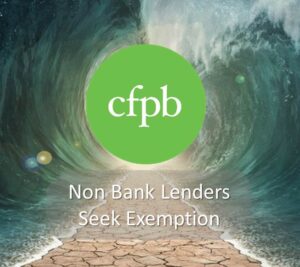 As independent non-bank lenders take the lead away from traditional banks in originating new mortgage business, they also want to be excluded from direct CFPB supervision. They are not the only ones.
As independent non-bank lenders take the lead away from traditional banks in originating new mortgage business, they also want to be excluded from direct CFPB supervision. They are not the only ones.
Small to mid-size non-bank mortgage lenders, like some community banks and credit unions with assets under $10 billion, are seeking exclusion from CFPB audits and enforcement actions.
A bill introduced in the House by Rep. Roger Williams (R/TX) would allow this exemption to independent non-bank mortgage lenders with a net worth of less than $50 million, which originate less than 25,000 loans a year.
That could cover quite a few lenders that could become exempt from CFPB supervision, enforcement, and third-party vendor management audits. This is supported by the Community Home Lenders Association and the Community Home Lenders of America.
Both trade groups sent a letter to Treasury Secretary Mnuchin requesting support for such legislation. They and the Bill request that the supervision and auditing of smaller, independent, non-bank mortgage lenders be done solely by the states in which these lenders do business.
At issue is the increased cost of having the smaller lenders audited by both CFPB and the states, with potential enforcement actions and related fines coming from both.
This is an expensive double whammy. Why should these smaller lenders be subject to a dual regulatory process and have to answer to two very different oversight entities?

The obvious fear from those who oppose such an action is that with more loans being originated by these non-bank lenders consumers may not be adequately protected. The trade groups argue that the state auditors have done, and continue to do, a fine job of keeping lenders in line.
To alleviate fears, Glenn Corso, Executive Director of the Community Home Lenders of America, made it clear that these lenders are not asking to be exempt from Dodd-Frank or the CFPB rules, just from CFPB direct oversight.
Further, the Williams Bill offers additional safeguards by allowing state regulators to ask CFPB for assistance when they deem necessary in conducting their exams.
The battle rages on to defang the CFPB. What’s your take? Do you think small independent non-bank mortgage lenders should get a break?
I guess it all depends on how you see the play…
